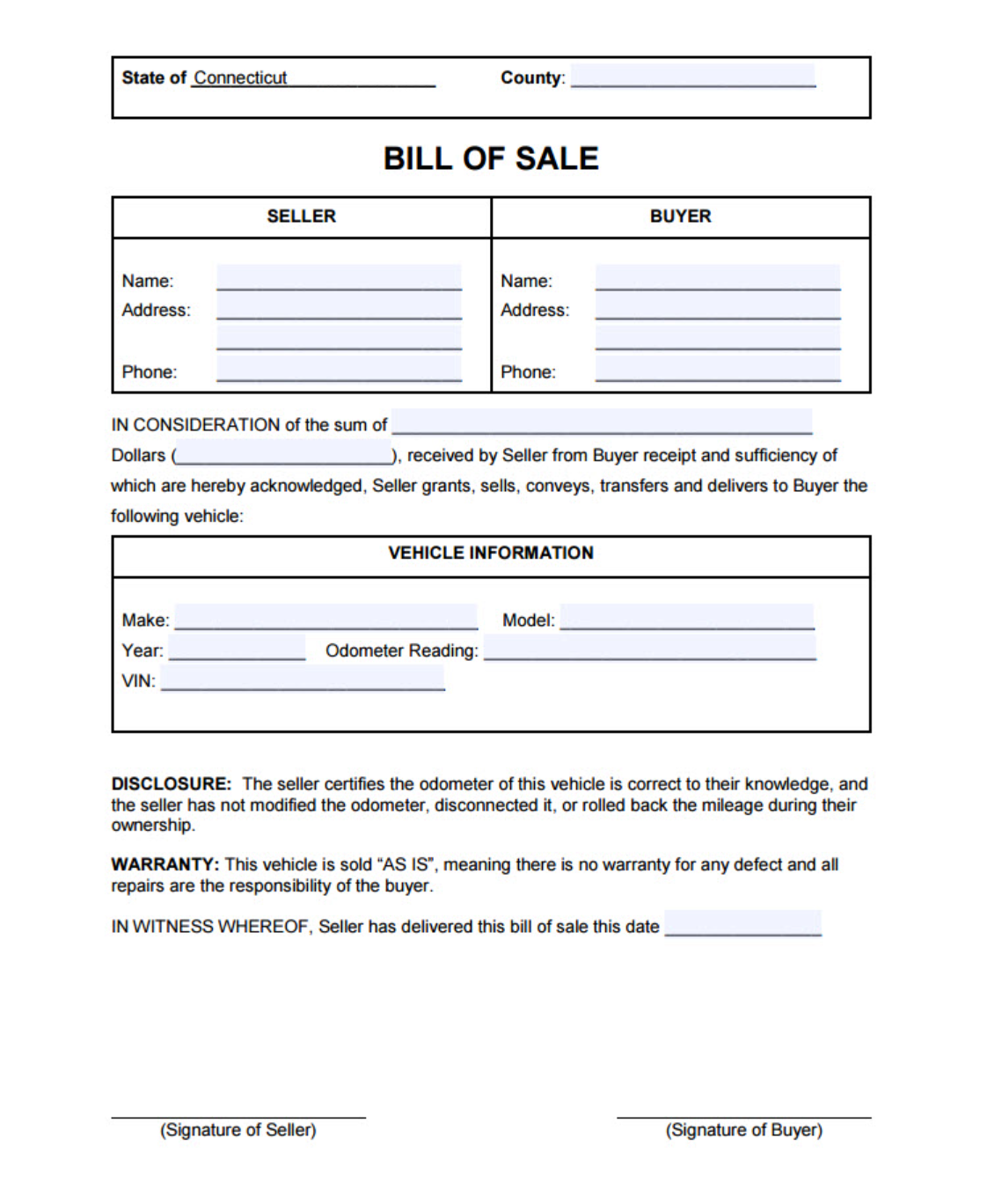Connecticut Motor Vehicle Bill of Sale
Is a Vehicle Bill of Sale Required in Connecticut?
In Connecticut, if you want to make a deal concerning the transfer of a motor vehicle, you should ensure you create a bill of sale to legitimate the operation. The paperwork covers all the essential details, from the parties' personal data in the deal to the specific details required by the state.
It is highly recommended that one keep a copy of the vehicle bill of sale to solve certain complications that might arise during and after the transfer of ownership. The document includes the parties' names, their current addresses, and a properly written description of the motor vehicle in question, including VIN, the year of creation, and a price.
The Connecticut vehicle bill of sale form should be dated and signed by both agreement members. A person selling a motor vehicle must fill out and sign the bill of sale and pass it to the buyer to complete the operation lawfully.
As to salvaged motor cars, one does not have to own a specific form of a bill of sale. To ensure the procedure’s success, it is highly recommended that the car undergoes a safety check-up.
The bill of sale is essential when registering a vehicle in Connecticut. The state's DMV requires an adequately completed bill of sale as part of the documentation process for transferring ownership and registering a vehicle. It serves as proof of the transaction and ensures the new owner can provide evidence of ownership.
Other documents you are required to prepare along with a car bill of sale are:
-
Title Certificate
-
Application for Registration and Title (Form H-13B)
-
Proof of Insurance
-
Proof of Identity and Residency
-
Odometer Disclosure Statement
-
Emissions Test Certificate
-
VIN Verification
-
Sales Tax Payment
What Information Do You Need to Cover in the Bill of Sale?
A motor vehicle bill of sale provided by the CT DMV is a vital document that facilitates the transfer of ownership of a motor vehicle. It offers legal protection and transparency to both the buyer and the seller, ensuring a smooth transaction process.
The CT DMV's official bill of sale form includes essential details about the transaction, such as:
-
Vehicle Information: This includes the make, model, year, vehicle identification number (VIN), and any other relevant details that uniquely identify the vehicle.
-
Seller and Buyer Information: The parties' names, addresses, and contact details must be documented.
-
Purchase Price: The agreed-upon purchase price of the vehicle must be specified in the bill of sale.
-
Date and Signatures: The date of the transaction and the signatures of both the seller and the buyer are required to validate the agreement.
-
Odometer Reading: To prevent fraud and provide accurate information about the vehicle's mileage, the bill of sale must also include the odometer reading at the time of the sale.
A bill of sale for a car offers protection by detailing the condition of the vehicle at the time of sale. If the seller makes any promises or warranties, these must be documented in the form, ensuring that the buyer's rights are upheld. The bill of sale also protects sellers by clearly indicating the date their responsibility for the vehicle ends. This can be important if the buyer fails to transfer the title promptly or if any legal issues arise after the sale.
The bill of sale can be crucial for maintaining an accurate vehicle history. It provides a trail of ownership changes, which can be helpful for future buyers, insurance companies, and even law enforcement agencies.
Please Select another State below
Auto Bill of Sale for Connecticut - CT. Do you want this form for another state? Select one: AL , AK , AZ , AR , CA , CO , CT , DE , DC , FL , GA , HI , ID , IL , IN , IA , KS , KY , LA , ME , MD , MA , MI , MN , MS , MO , MT , NE , NV , NH , NJ , NM , NY , NC , ND , OH , OK , OR , PA , RI , SC , SD , TN , TX , UT , VT , VA , WA , WV , WI , WY
Unlike free auto bill of sale form providers, our forms are professional and protect your rights. A standard vehicle bill of sale form is essential for your total legal protection.
